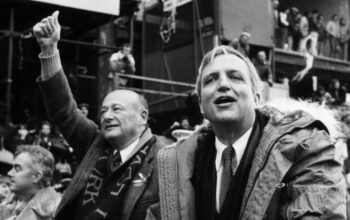
Prime Minister Benjamin Netanyahu of Israel was discharged from the hospital on Sunday in what medical officials described as “excellent condition,” after an overnight stay involving a series of tests and being fitted with an implanted heart monitor.
Mr. Netanyahu, 73, had been admitted on Saturday to the Sheba Medical Center, a leading hospital near Tel Aviv, after feeling mild dizziness. The medical staff concluded that he was dehydrated.
On Sunday morning, he underwent heart tests, which the prime minister’s office and hospital officials said had all come back clear.
“His heart is completely normal, without any findings,” Prof. Amit Segev, the director of the hospital’s cardiology unit, said in a statement shortly before Mr. Netanyahu’s release.
Professor Segev said that “a series of comprehensive and routine examinations” were performed while the prime minister was fully conscious and included an electrical test of the heart. No heart arrhythmia was found, the professor said.
He added that Mr. Netanyahu had been fitted with a subcutaneous monitor, “as is customary, to allow the close medical professional team of the prime minister to continue regular monitoring.”
Mr. Netanyahu, Israel’s longest-serving prime minister, released a video on Saturday evening from the hospital looking cheerful and stating that he was “feeling very well,” seeking to allay fears about his well-being amid initial, conflicting reports about his condition.
He said he had spent Friday in the sun at the Sea of Galilee in northern Israel, where temperatures had reached 100 degrees Fahrenheit, “with no hat, without water — not a good idea.” The day out had included a boat ride on the lake in the intense afternoon heat.
“Thank heavens, I’m feeling very well,” Mr. Netanyahu added. “I have just one request of you: We’re undergoing a heat wave in this country. So I ask of you: Spend less time in the sun, drink more water, and may we all have a good week.”
It was later announced that he would spend the night in the hospital and undergo additional routine tests, and that the regular weekly cabinet meeting scheduled for Sunday morning would be postponed until Monday.
Mr. Netanyahu, who is facing trial on corruption charges, is in the middle of one of the stormiest periods of his political career, having to balance between competing demands. On one side is his hard-line right-wing and religiously conservative coalition, which is seeking a fundamental judicial overhaul; on the other is a surging popular protest movement made up of many key sectors of Israeli society. Supporters of the overhaul say it is necessary to restore a correct balance of power between the branches of government and weaken the authority of unelected judges. Its opponents say the proposed changes are anti-democratic and will lead to a kind of dictatorship.
Saturday night saw enormous street protests for a 28th consecutive week, as tens of thousands gathered in Tel Aviv, a few miles from where Mr. Netanyahu was spending the night in the hospital. The nationwide protest movement includes military reservists and leaders of the high-tech industry and the medical profession. Union leaders have warned of a general strike should the plan proceed.
The next two weeks could prove critical, before Parliament adjourns at the end of July for a long summer recess.
Israel is also facing tensions in the occupied West Bank and along the hostile northern border with Lebanon.
Mr. Netanyahu was briefly hospitalized in October, after feeling pain in his chest in the weeks before last year’s election. He was filmed jogging the next morning. He was also briefly hospitalized in 2018 after suffering from a fever.



